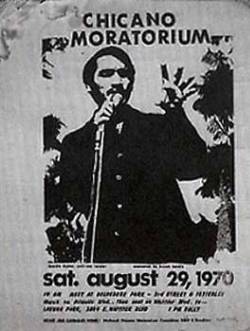
On August 29, 1970, thousands of Chicanos marched in Los Angeles to protest and demand an end to the war in Vietnam. It would be the first major upheaval of the Chicano community against U.S. imperialism. Not unlike today, it was the poor and working class of the United States against the poor workers, and in this case, mostly peasants, of another country.
Widely quoted figures held that Latinos accounted for 6% of the nation’s population but represented 20% of the casualties in Vietnam. More than 20 deferment classifications, including ministries, studies or civilian occupations were available to predominantly upper-class White youths to protect them from the ravages of war. Working class and poor whites, Chicanos, Blacks and Native Americans ages 19 to 25 would mostly know only one classification: 1-A, “Available for Military Service.”
The “surge”: During the Tet Offensive of January 1968, Vietnamese liberation forces struck deep in the south, including Saigon, with a devastating human and economic toll for both sides. That year, U.S. troop levels reached their peak, with more than a half million soldiers in Vietnam. U.S. generals were stunned by the tactical depth and ferocity of the offensive.
Amid mixed reactions from politicians and calls for incremental increases, the Joint Chiefs declared that only a commitment of more than one million U.S. soldiers would turn the inevitable tide. It would require a “surge” of about 400,000 men, the expenditure of an additional $10 billion during fiscal 1969 and another $15 billion in 1970. These figures would have a profound impact on the economy of that time.
The period of the late sixties was also a time of economic stress and monetary concerns. During 1967 and 1968, the United States was struggling with one of the most severe monetary crises of the period. President Lyndon Johnson concluded that without a new tax bill and budgetary cuts, the nation would face even higher inflation “and the possible collapse of the monetary system.”
In February 1968, the Military Assistance Command, Vietnam (MACV), posted the highest casualty figures for a single week during the entire war: 543 killed and 2,547 wounded. The year 1968 would become the deadliest year of the war for U.S. forces with 16,592 soldiers killed. The Selective Service System announced a new draft call for 48,000 men, the second highest of the war.
By 1970, with more than 334,000 soldiers fighting in Vietnam, the Johnson administration and U.S. generals debated calls for escalation and wider bombing. The public was demoralized and the Latino community had seen enough of their youth coming home in body bags. The 1970 Chicano Moratorium turned into a “police riot” leaving four dead and thousands injured and jailed. The rest is history and all too familiar to those of us who suffered through this national tragedy.
President Barack Obama recently cited the costs of current wars as draining $1 trillion from the economy, contributing to the current deficit. The research report, “Costs of War,” puts spending since 9/11 at $2.3 trillion–$2.7 trillion with an additional $1 trillion more in interest payments. We cannot forget the social and human costs that we may never quantify.
The past becomes the present and if we do nothing, it will be the future for another generation of youth. Today, it is a volunteer army, with roughly 1.4 million people serving on active duty, or less than one in 200 of the U.S. population. As a result, it is not as widely felt as other wars. According to the U.S. Department of Veterans Affairs, about one-third of the adult homeless population are veterans, with Vietnam vets making up nearly half, or the largest number.
Veterans are only 8% of the population but more than 20% of the homeless. Despite the pride we take in our heroic armed forces, on any given night we will find more than 100,000 veterans seeking shelter from the streets. Roughly 56% of all homeless veterans are African American or Hispanic, despite accounting for only 12.8% and 15.4% of the U.S. population, respectively.
For the Latino community, the irony is even more tragic, with an increasing number of “Green Card” warriors, born in Mexico and Latin America, who fight for a country that blames immigrants for the current economic woes. We now know with certainty that the crisis has been brought on by the very wars in which they fight and die. Nonetheless, they fight on. Today or tomorrow, on a desolate road, somewhere in Iraq, Afghanistan, Pakistan or Africa, another young soldier will give his life for a country that is not really his own. 
Join Raza Against War, Peace Fresno, the Community Alliance, and the Brown Berets for the Public Forum Against War, with Fernando Suarez, on Thursday, August 25th, and the Marcha Por La Paz on Saturday, August 27th. Together we will launch the “American Autumn” of struggle against U.S. militarism! For more information, contact the groups above, or email raza_against_war@yahoo.com.
“RAZA AGAINST WAR” EVENTS
Thursday, August 25 • 6 p.m.–8 p.m.
A Public Forum Against War, featuring Fernando Suarez del Solar, Gold Star father of Jesus Suarez, Green Card soldier, who died in Iraq. They were the subject of the video, “A Senseless Death”, along with undocumented Guatemalan orphan, Jose Antonio who also dies in Iraq. For more info, contact Stan Santos at raza_against_war@yahoo.com or 559-908-6701.
Friday, August 26 • 12 noon, (gather at 11:30), Federal Building, 2500 Tulare, downtown Fresno.
Saturday, August 27 • 3 p.m.
A Marcha por la Paz/Chicano Moratorium will take place on southeast Fresno’s Cesar Chavez Boulevard, also known as Kings Canyon Road, gathering at Huntington and 1st Street and proceeding to the Mosqueda Center.
Chicano Moratorium Gathering following the Marcha 4 p.m. to 8 p.m. featuring:
Charlie Trujillo, author of Soldados, Chicanos in Vietnam and the award-winning video “Chicanos.” There will be video and cultural presentations, information booths and food. For more info, contact Stan Santos at raza_against_war@yahoo.com or 559-908-6701.

[…] la guerra y el dolor. […]